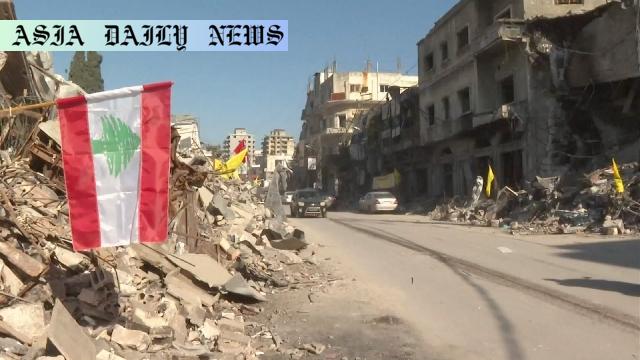Ceasefire: Israel extends troop presence in south Lebanon post-agreement deadline citing Lebanese government’s incomplete enforcement.
Key Point 1: Israel delays its troop withdrawal from southern Lebanon, breaching the agreed ceasefire timeline.
Key Point 2: Lebanese government has yet to fully implement agreements tied to troop deployment in the south.
Key Point 3: Hezbollah threatens countermeasures over the violation and ongoing Israeli military activities in Hezbollah’s zones.
Key Point 4: Concerns escalate over the stability of the current ceasefire agreement.

Introduction to the Ceasefire Agreement
The ceasefire agreement between Israel and the Shia Muslim group Hezbollah marked a significant step toward ending prolonged fighting in southern Lebanon. Signed in November, the deal set specific conditions: Israeli troops and Hezbollah forces would both withdraw, and Lebanon’s military would assume responsibility for enforcing the peace across the southern region within 60 days. The stipulated deadline approached this Sunday, but challenges remain as Israel has announced its inability to withdraw troops fully within the agreed timeframe.
Israel’s Stance on Withdrawal
On Friday, Israel’s Prime Minister’s Office confirmed that the withdrawal process will surpass the Sunday deadline, citing the Lebanese government’s failure to fully implement the agreement. Israel has argued that certain military and operational gaps in Lebanon’s southern military deployment impede their timely disengagement. In the meantime, the Israeli military continued operations targeting Hezbollah’s facilities, claiming to have destroyed multiple rocket launchers and underground routes allegedly used by Hezbollah militants.
US Response and Broader Implications
The Israeli delay has sparked diplomatic discussions involving key stakeholders. According to CNN, Israel’s government has communicated its intentions to President Donald Trump’s administration. Reports suggest that Israel plans to maintain its forces in Lebanon for an additional 30 days. Such developments heighten concerns about whether the ceasefire can endure or if this breach will reignite hostilities.
Hezbollah’s Reaction
Hezbollah regards Israel’s decision as a blatant violation of the agreement. Declaring their dissatisfaction, they’ve issued warnings that any prolonged breach will trigger a countermeasure. The Shia group has historically been defensive against Israeli military actions, framing this new development as another invasive act.
Potential for Ceasefire Collapse
With both sides trading accusations and tensions increasing, the durability of the ceasefire agreement appears uncertain. An unstable ceasefire could destabilize southern Lebanon further, potentially drawing in international and regional players. Continued Israeli military activities, such as the targeting of alleged weaponry and militant pathways in southern Lebanon, could provoke retaliation in a cycle of aggression.
The Role of the International Community
Given the stakes, there is an urgent need for international diplomacy to intervene and reaffirm commitment to the ceasefire. The United Nations, which played a significant role in brokering the agreement, is faced with the challenge of ensuring compliance from all parties involved. The broader geopolitical implications of a collapsed ceasefire may shift dynamics in the already volatile Middle East region.
A Call for Resolution
For stability to return to southern Lebanon, both Israel and Hezbollah must adhere to the ceasefire terms. The Lebanese government, too, carries a substantial role in fulfilling its obligations by deploying its military. Without these actions, trust between conflicting parties and the agreement’s durability remain at considerable risk.
Conclusion
The delay by Israel in adhering to the withdrawal deadline has introduced fresh complexities into an already fragile peace process. Continued dialogue and tangible actions from all sides are necessary to preserve the ceasefire and prevent the escalation of violence in the region.
Commentary
Tensions Threaten the Fragile Peace
The situation unfolding in southern Lebanon highlights just how precarious ceasefire agreements can be in regions fraught with long-standing hostilities. Israel’s decision to delay troop withdrawal, while justified from their perspective due to unfulfilled Lebanese obligations, carries serious risks. It not only undermines the agreement but also exacerbates local and regional tensions, especially with Hezbollah’s stern warnings of retaliation.
Hezbollah’s Frustration Cannot Be Ignored
It’s crucial to understand Hezbollah’s perspective, as their perceived violations of the agreement further exacerbate historical grievances. The group has long painted itself as a defender of Lebanese sovereignty in the face of Israeli actions. Israel’s continued operations within their zones only fuels their narrative, solidifying their support among some Lebanese communities and complicating international diplomatic efforts.
Protecting the Ceasefire
To preserve the fragile peace, decisive actions by all parties are required. Israel, Hezbollah, and the Lebanese authorities must prioritize adherence to the ceasefire’s prerequisites rather than resorting to actions that provoke one another. Diplomacy must prevail to ensure this agreement does not meet the fate of previous failed peace initiatives in the region.
Conclusion
Ultimately, this episode serves as a somber reminder of the complexities in achieving lasting peace in conflict zones. The international community has an important role to play in pushing all sides toward honoring their commitments and minimizing the potential fallout from missteps or delays.


